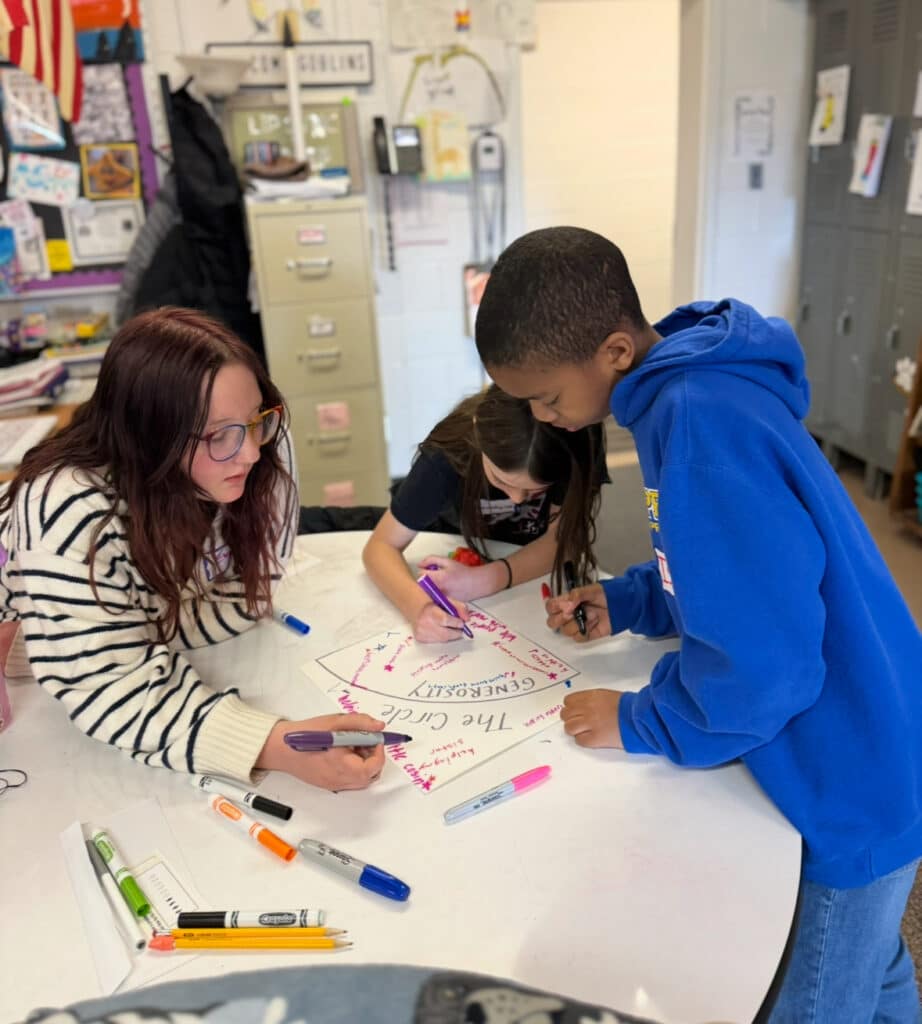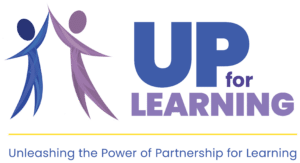
In February 2025, UP for Learning and Greater Rutland County SU (GRCSU) rekindled exciting district-wide work. Each school in GRCSU was offered a choice of Youth Participatory Action Research (YPAR) projects that they could customize to meet their school’s needs and goals. These offerings focused on restorative practices, school climate and student voice, leadership training, Getting to ‘Y’ (GTY) enhancements, and the Personal Power and Community Connections (P2C2) program.
Three elementary schools opted to begin or continue P2C2 programming started in 2023-2024 for upper elementary classrooms in Poultney, Middletown Springs and Wells Village. UP staff held retreats with each school focused on community building, asset mapping using the Circle of Courage, data analysis, and root cause analysis/action planning.
Learn more about the powerful work occurring at each of the schools:
Poultney ES: Fifth graders in Abigail Racine’s class began their P2C2 journey with lots of laughter, connection, and thoughtful reflection. After two sessions of team building, data collection, and data analysis, the group voted to celebrate the strength “I have someone at school I am excited to see” and explore the concern “When I have a problem with another student, I know how to fix it.” They are now brainstorming ideas for action projects that will provide direction for future sessions. Youth are eager to work on supporting their peers with problem-solving skills when challenges arise. They are also excited to develop structures, rituals and routine to ensure that students are able to share their ideas about how to make their school better for all students.
Middletown Springs ES: In March, fourth grade students from Brooke Makepeace’s class began their P2C2 journey. In their first two sessions, students explored the concept of personal power and community connection through interactive activities like “Step Forward, Step Back” and a Pictionary-style brainstorm of leadership-related terms, sparking thoughtful reflections on how their actions impact others. They celebrated the strength: “I have someone at school I’m excited to see,” and identified the concern: “I can make the school a better place”—with many students feeling ambivalent about their capacity for change-making at school. They are currently brainstorming action ideas aligned with these strength and growth areas, including a “Shout-Out Squad” and “Bright Ideas Box,” and will continue working to prioritize next steps.
Wells Village School: This 6th grade class kicked off P2C2 with strong energy and curiosity, engaging with school climate data and identifying patterns that matched their lived experience. The class voted to celebrate the strength “My school wants me to do well” and explore the concern “Students behave so the teacher can teach.” They are currently working with their teacher to generate project ideas and will work together to decide on a direction for action.
This year’s work in West Rutland School supports the school’s burgeoning Student Council in using new and existing data and YPAR cycles to make a strong, positive impact on their school community. The first West Rutland School Student Council retreat, co-facilitated by three Student Council Members, began with ice-breaking activities which fostered initial connections and set a collaborative tone, followed by a leadership values activity that helped council members lay a foundation for understanding how individual needs and values shape group dynamics. In the Compass Points Leadership Activity, participants identified their personal leadership styles, deepening their understanding of how to honor and leverage each other’s strengths in collaboration.
A major part of the day included using data analysis protocols to review the latest school data from the Youth Risk Behavior Survey (YRBS). In a “data walk,” small groups explored school strengths, challenges, and potential actions the Student Council could take. The second retreat will review their action planning for further data collection in prioritized areas and proposed strategies for moving forward.
The Proctor High School Getting to ‘Y’ team also opted into enhancements and customized support that deepen their team’s identity and impact. After attending the Getting to ‘Y’ (GTY) training on October 22nd, 2024, the Proctor team intended, at this time, to continue work from the prior year based on priorities they previously identified in the 2021 YRBS data. Since that training, the Proctor team has continued efforts to improve student mental health, including holding – and working to codify in school policy – an annual wellness day. This work recalls the Restorative Practices work that initially connected UP and GRCSU and plays an important role in the school’s culture. The Proctor Advisors have participated in monthly GTY Advisor Network meetings. UP will support them in their Data Analysis Retreat on May 2nd, and in keeping the momentum going.
This work so far has been supported by youth co-facilitation, including three high school students from West Rutland School and a student from Otter Valley who is supporting facilitation for Proctor High School’s Getting to Y “enhanced” retreat. These youth are part of UP’s Youth Internship Program (YIP) and are compensated for their time planning, designing and facilitating programs.
With final retreats scheduled in May, each school team is poised to finish the year with a realized action plan. The three elementary schools are currently achieving consensus about the projects they want to implement in order to have a positive “ripple effect” in their school’s culture, whether by creating lessons for students in younger classrooms, developing a “Bright Ideas Box” for students to share their ideas for school change, or developing a Friday ritual of celebrating and uplifting supportive teachers in their lives. By the end of the school year, they will have completed their projects through action planning and coaching support and will have the opportunity to share their contributions with the school community.

